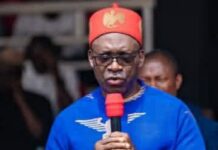Stakeholders in the power sector have raised concerns over the persistent financial challenges affecting Nigeria’s electricity value chain as the nation marks 65 years of independence.
They said in Lagos on Tuesday that liquidity constraints remained the biggest obstacle to providing stable and reliable power to millions of Nigerians.
Group managing director of Sahara Power Group, Kola Adesina, described the sector as being in a state of chronic financial insolvency.
He noted that power generation companies (GenCos) and gas suppliers were owed over N4 trillion.
“Only about 35 per cent of monthly invoices are paid, leaving stranded capacity and stifling both maintenance and fuel supply,” he lamented.
Mr Adesina also identified non-cost-reflective tariffs as a fundamental structural flaw.
He explained that while the April 2024 Band A tariff increase from N66 to N225/kwh helped reduce the cost-recovery gap for high-end users, it also triggered political backlash and regulatory uncertainty.
“Partial rollbacks have only deepened policy instability. Meanwhile, transmission constraints and grid instability remain persistent problems.
“Despite installed generation capacity, Nigeria’s wheeling capacity lags far behind, resulting in frequent system collapses. Aging infrastructure, limited SCADA coverage, and vandalism further compound the crisis,” he said.
Mr Adesina warned of misalignments in the gas-to-power chain, citing irregular payments, pipeline bottlenecks, and foreign exchange exposure that limit gas availability for thermal plants.
“Contractual disconnects between gas supply agreements and power purchase agreements only worsen the situation. It all circles back to liquidity,” he stressed.
According to him, the Electricity Act 2023, which decentralises power sector responsibilities to the states, presents both opportunities and risks.
“Decentralisation can foster healthy competition. But without a unified regulatory framework, we risk dangerous fragmentation that could derail market stability,” he noted.
To resolve the sector’s enduring crisis, Mr Adesina proposed urgent reforms.
He added that these include securitising legacy debts owed to GenCos and gas suppliers through a time-bound bond programme tied to improved metering and reduced losses.
He also urged strict enforcement of tariff discipline under the MYTO framework, targeted subsidies for low-income users, and government guarantees for FX-indexed gas payments.
Mr Adesina further recommended granting operational independence to the transmission system operator (TSO), scaling up metering, supporting mini-grids and off-grid solar, hybridising hydro and gas plants with renewables, and launching competitive tenders backed by bankable power purchase agreements (PPAs)
Similarly, Olukayode Akinrolabu, chairman of the Customer Consultative Forum for Festac and Satellite Town, acknowledged that ongoing electricity reforms under President Bola Tinubu’s administration had recorded some gains but not without persistent challenges.
He said Nigeria’s functional power generation capacity rarely exceeds 4,000 megawatts, which remains grossly inadequate to meet the country’s energy needs.
“One of the most pressing issues is the persistent inadequate generation capacity. In spite of reforms, the sector continues to fall short of expectations,” he said.
Mr Akinrolabu highlighted grid instability, noting that the national grid suffered more than 10 partial or complete collapses in 2023 and 2024 alone.
He also lamented the metering gap, with an estimated 6.2 million customers still unmetered, leading to widespread estimated billing, loss of consumer trust, and revenue shortfalls for Distribution Companies (DisCos)
He said the Transmission Company of Nigeria (TCN) struggles to move power efficiently from GenCos to end-users, with frequent disruptions caused by vandalism and inadequate gas infrastructure funding.
“Much of the transmission and distribution network is obsolete and dilapidated, contributing to high technical losses and continued grid instability,” he added.
According to him, DisCos and GenCos face severe financial stress due to low tariff recovery, widespread electricity theft, and weak liquidity.
He also warned that inconsistent policies and regulatory ambiguity discourage investors.
“Without a stable regulatory environment, investor confidence will remain low, and the sector will continue to suffer,” he said.
Also, electricity market analyst, Lanre Elatuyi, stressed the urgent need for clear and consistent policies to attract private sector investment into Nigeria’s power industry.
He said investors require a fair regulatory environment, legal protection, and assurances that the government will honour its financial obligations.
He expressed concern over the rising debt owed by government ministries, departments, and agencies (MDAs), calling it a red flag
Mr Elatuyi also lamented the absence of strict penalties for energy theft, describing it as another factor undermining investor confidence.
He said, “We must treat the power sector as an integrated whole, understanding that each segment has distinct goals but ultimately must work together for reliable and affordable electricity.”
He explained that affordability depends on ensuring the lowest possible supply costs, which begin with investment decisions and extend through efficient dispatch of generators.
Mr Elatuyi outlined two market models Nigeria could adopt: a centralised market where a central authority dispatches generators based on technical constraints or a decentralised market relying on bilateral contracts complemented by a balancing spot market.
He added that pricing mechanisms such as locational marginal pricing or postage stamp pricing were vital for efficient market operations.
“While these concepts may seem unfamiliar, they are fundamental to delivering affordable and reliable electricity. Our power sector is no longer a vertically integrated system.
“To move forward, we must embrace the fundamentals of a liberalised electricity market,” he said.
(NAN)





